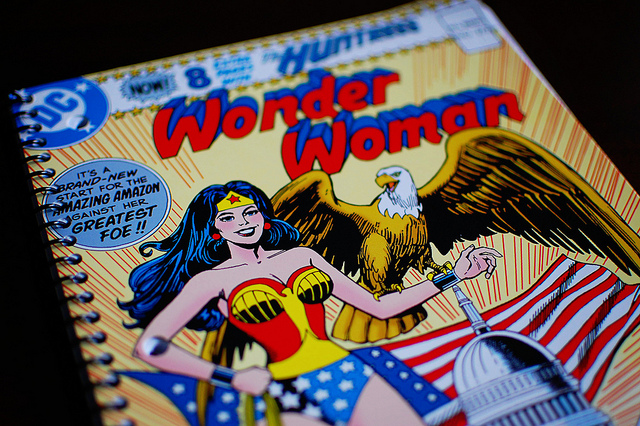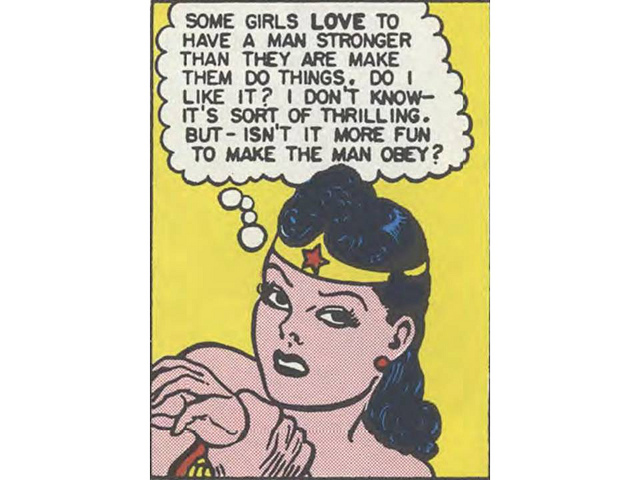[Guest Post] The Mystery That Isn’t: Jill Lepore’s “The Secret History of Wonder Woman”

Editor’s Note: Today’s guest post is by Dale DeBakcsy, who also blogs over at Mad Art Lab. If you aren’t familiar with the history of Wonder Woman, check out the Bitch Magazine article that is linked below (before reading Lepore’s book).
*****
If you care to suss out the state of popular American feminism in any particular decade, a good place to start is often the pages of that era’s Wonder Woman. From Dennis O’Neil to George Pérez to Gail Simone to Brian Azzarello, the writers of Wonder Woman, at their best, have made it the place where comic books grapple most honestly with issues of gender and identity in America.
Jill Lepore’s The Secret History of Wonder Woman is not about any of that, and if you’re going into it expecting a history of Wonder Woman comics that lifts the veil on its various authors’ motivations and political concerns, you are going to be vastly disappointed. O’Neill is mentioned once, the others not at all. This is not an exhaustive accounting of the evolution of Wonder Woman, and as long as you don’t approach the book with that expectation, you’ll be in for an engrossing time.
For this is, quite purposefully, a dual biography, of Wonder Woman creator William Moulton Marston on the one hand and of twentieth century feminism on the other. Marston was an idealistic charlatan so riddled with personal failings and transparent schemes that he is quite irresistible. He lived with his wife and mistress (and, when she was in town, his second mistress) while crafting cunning plans for the promotion of his lie detection device, his psychological expertise, and, ultimately, his stunningly successful comic book series.
Now, Lepore has a habit of somewhat overstating the obscurity of the rather salacious facts in Marston’s life. “Stop the presses. I’ve got the history of Wonder Woman,” she declares in the preface after a listing of her thorough research efforts, and again in the Epilogue she laments how, until now, “The secret history of Wonder Woman stayed secret.” We’re meant to be rocked back on our heels by the revelation of Marston’s strange love life, his obsession with bondage, and the conscious degree to which he implanted explicitly radical feminism in the early Wonder Woman story arcs. Except that, for the most part, this has all been common knowledge for some time. I recall reading an issue of Bitch Magazine back in 2006 with an article by KL Pereira which stated all of those facts quite explicitly.
There is an awkwardness, then, that creeps in from time to time when long-known information is presented as a grand revelation or when an individual is presented as a forgotten figure of history when, in fact, they’ve been quietly celebrated for a decade now. Lepore clearly worked hard at this book, slogging through archives and carrying out interviews, and had the title been Some More Details That Flesh Out William Moulton Marston’s Private and Professional Life, everybody would have benefitted from the understatement.

Still, it’s a great story, and if you have never read about it, The Secret History of Wonder Woman is an engaging and thorough narration not only of Marston’s curious life but also of those women who lived in the strange world he carved out for himself, and whose work and sacrifice made his constant scheming possible. Had the book told just that story, it would have been well worth the read, but it also combined Marston’s life with a twisting narration of the events of twentieth century feminism, from Emmeline Pankhurst, through Margaret Sanger (the aunt of Marston’s primary mistress), to Gloria Steinem and Ms. Magazine. The story of Wonder Woman can’t and shouldn’t be told without reference to these formative figures, and Lepore’s willingness to devote a significant portion of this book to documenting the rise and fall of various theories of feminism throughout the twentieth century, and their impact on the development of mainstream comics, is refreshing. Comic book fans coming to this book for the Wonder Woman will leave it with a better understanding of the history of gender theory, and that can only have good results in the ongoing effort to make more representative and gender-conscious comics in the future.
It’s not exactly a secret history, and it stops caring about the evolution of Wonder Woman comics after 1972, so it’s not exactly a complete history, but it is a fun and knowing glance at one important chapter in the Wonder Woman story, and about the philosophical and psychological atmosphere that made that chapter possible. If more comic book history were written this way, the medium would perhaps start enjoying a respect on par with its creative merit.
Here’s hoping.
******
Dale DeBakcsy writes the Women In Science series at MadArtLab and the Cartoon History of Humanism at The Humanist. He is a regular contributor to Free Inquiry, American Atheist Magazine, and Philosophy Now.




